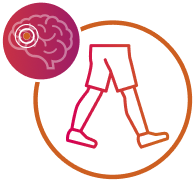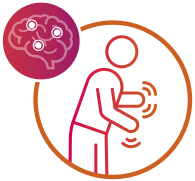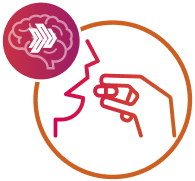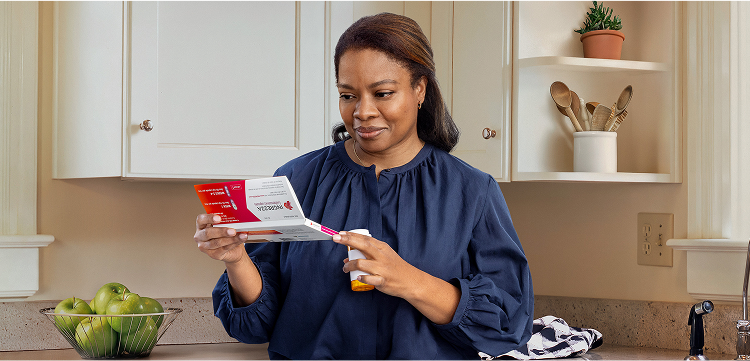Important Information
Approved Uses
INGREZZA® (valbenazine) capsules or INGREZZA® SPRINKLE (valbenazine) capsules are prescription medicines used to treat adults with:
movements in the face, tongue, or other body parts that cannot be controlled (tardive dyskinesia).
involuntary movements (chorea) of Huntington’s disease. INGREZZA or INGREZZA SPRINKLE do not cure the cause of involuntary movements, and do not treat other symptoms of Huntington’s disease, such as problems with thinking or emotions.
It is not known if INGREZZA or INGREZZA SPRINKLE is safe and effective in children.
IMPORTANT SAFETY INFORMATION
INGREZZA or INGREZZA SPRINKLE can cause serious side effects in people with Huntington’s disease, including: depression, suicidal thoughts, or suicidal actions. Tell your healthcare provider before you start taking INGREZZA or INGREZZA SPRINKLE if you have Huntington’s disease and are depressed (have untreated depression or depression that is not well controlled by medicine) or have suicidal thoughts. Pay close attention to any changes, especially sudden changes, in mood, behaviors, thoughts, or feelings. This is especially important when INGREZZA or INGREZZA SPRINKLE is started and when the dose is changed. Call your healthcare provider right away if you become depressed, have unusual changes in mood or behavior, or have thoughts of hurting yourself.
INGREZZA or INGREZZA SPRINKLE can cause serious side effects, including:
- Allergic reactions. Allergic reactions, including an allergic reaction that causes sudden swelling called angioedema, can happen after taking the first dose or after many doses of INGREZZA or INGREZZA SPRINKLE. Signs and symptoms of allergic reactions and angioedema include: trouble breathing or shortness of breath, swelling of your face, lips, eyelids, tongue, or throat, or other areas of your skin, trouble with swallowing, or rash, including raised, itchy red areas on your skin (hives). Swelling in the throat can be life-threatening and can lead to death. Stop taking INGREZZA or INGREZZA SPRINKLE and go to the nearest emergency room right away if you develop these signs and symptoms of allergic reactions and angioedema.
- Sleepiness and tiredness that could cause slow reaction times (somnolence and sedation). Do not drive a car or operate dangerous machinery until you know how INGREZZA or INGREZZA SPRINKLE affects you. Drinking alcohol and taking other medicines may also cause sleepiness during treatment with INGREZZA or INGREZZA SPRINKLE.
- Heart rhythm problems (QT prolongation). INGREZZA or INGREZZA SPRINKLE may cause a heart rhythm problem known as QT prolongation. You have a higher chance of getting QT prolongation if you also take certain other medicines during treatment with INGREZZA or INGREZZA SPRINKLE. Tell your healthcare provider right away if you develop any signs or symptoms of QT prolongation, including: fast, slow, or irregular heartbeat (heart palpitations), shortness of breath, dizziness or lightheadedness, or fainting or feeling like you are going to faint.
- Neuroleptic Malignant Syndrome (NMS). NMS is a serious condition that can lead to death. Call a healthcare provider right away or go to the nearest emergency room if you develop these symptoms and they do not have another obvious cause: high fever, stiff muscles, problems thinking, irregular pulse or blood pressure, increased sweating, or very fast or uneven heartbeat.
- Parkinson-like symptoms. Symptoms include: body stiffness, drooling, trouble moving or walking, trouble keeping your balance, shaking (tremors), or falls.
Before taking INGREZZA or INGREZZA SPRINKLE, tell your healthcare provider about all of your medical conditions including if you: have liver or heart problems, are pregnant or plan to become pregnant, or are breastfeeding or plan to breastfeed.
Tell your healthcare provider about all the medicines you take, including prescription and over-the-counter medicines, vitamins, and herbal supplements. Make sure you tell all of your healthcare providers that you are taking INGREZZA or INGREZZA SPRINKLE. Taking INGREZZA or INGREZZA SPRINKLE with certain other medicines may cause serious side effects. Especially tell your healthcare provider if you: take digoxin or take or have taken a monoamine oxidase inhibitor (MAOI) medicine. You should not take INGREZZA or INGREZZA SPRINKLE if you are taking, or have stopped taking, a MAOI within the last 14 days.
The most common side effects of INGREZZA or INGREZZA SPRINKLE in people with tardive dyskinesia are sleepiness and tiredness.
The most common side effects of INGREZZA or INGREZZA SPRINKLE in people with chorea associated with Huntington’s disease include sleepiness and tiredness, raised itchy red areas on your skin (hives), rash, and trouble getting to sleep or staying asleep.
These are not all of the possible side effects of INGREZZA or INGREZZA SPRINKLE. Call your doctor for medical advice about side effects. You are encouraged to report negative side effects of prescription drugs to the FDA. Visit MedWatch at
www.fda.gov/medwatch
or call 1-800-FDA-1088.
Dosage Forms and Strengths: INGREZZA and INGREZZA SPRINKLE are available in 40 mg, 60 mg, and 80 mg capsules.
Please see full
Prescribing Information, including Boxed Warning, and
Medication Guide.














